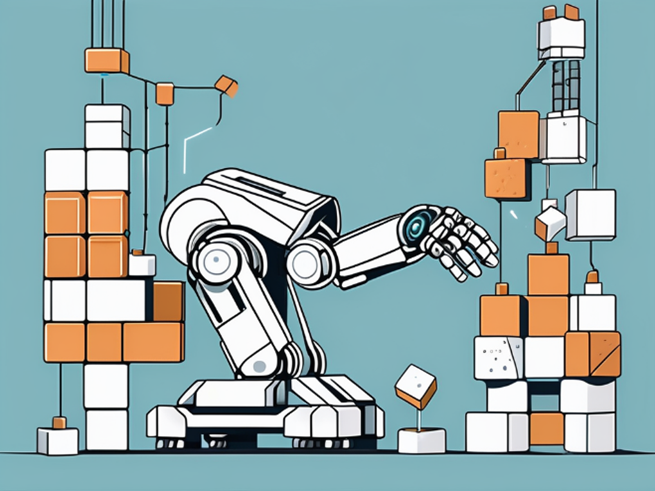Artificial intelligence (AI) has become a revolutionary technology in various industries, and its impact on project management methodologies, such as Agile, is no exception. Agile has long been regarded as a flexible and iterative approach to software development. In recent years, integrating AI into Agile practices has gained attention as organizations strive to enhance their project management capabilities and streamline processes. This article explores how to effectively use AI in Agile, from understanding the basics to implementing AI into Agile project management and exploring future trends.
Understanding the Basics of AI and Agile
Before diving into the integration of AI and Agile, it is important to establish a solid understanding of both concepts. AI refers to the development of computer systems that can perform tasks that typically require human intelligence, such as speech recognition, decision-making, visual perception, and language translation. On the other hand, Agile is a project management methodology that emphasizes collaboration, adaptability, and continuous improvement. It is designed to respond to unpredictability through incremental, iterative work cadences known as sprints.
When AI and Agile are combined, they form a powerful synergy that can revolutionize project management and software development. By integrating AI technologies into Agile practices, teams can streamline processes, improve efficiency, and drive innovation at a faster pace.
Defining AI in the Context of Agile
In Agile, AI can be harnessed to automate repetitive tasks, make data-driven decisions, and enhance project outcomes. By leveraging AI technologies such as machine learning and natural language processing, Agile teams can benefit from advanced data analysis and predictive capabilities, enabling better decision-making and improved project performance. AI can also assist in identifying patterns and trends in data that humans may overlook, leading to more informed and strategic project planning.
AI helps Agile teams optimize resource allocation, identify potential risks, and improve overall project predictability. By using AI algorithms, Agile practitioners can enhance their problem-solving abilities and make more accurate forecasts regarding project timelines and deliverables.
The Principles of Agile Methodology
Agile methodology is based on principles that promote flexibility, collaboration, and customer satisfaction. These principles include customer involvement throughout the project, embracing change, delivering working software incrementally, and fostering self-organizing and cross-functional teams. By adhering to these principles, Agile teams can prioritize customer needs, respond quickly to changes, and deliver high-quality software in a timely manner. The iterative nature of Agile allows for continuous feedback and improvement, ensuring that the end product meets the evolving requirements of the customer.
Agile methodology also encourages a culture of transparency and open communication, fostering trust and accountability among team members. This collaborative environment enables Agile teams to adapt to changing market conditions, customer preferences, and technological advancements, ultimately leading to successful value delivery to stakeholders.
The Intersection of AI and Agile
The integration of AI and Agile enhances project management practices and enables teams to adapt to changing requirements more effectively. When combined, AI and Agile open up possibilities for project teams to work more efficiently and innovatively. AI technologies, such as machine learning and natural language processing, can streamline communication within Agile teams. By analysing communication patterns and team dynamics, AI provides insights on potential bottlenecks or areas for improvement, fostering better collaboration and productivity.
How AI Complements Agile Practices
AI complements Agile by automating repetitive tasks like code reviews, bug identification, and test case generation. This allows development teams to focus on more value-adding activities. AI can also analyse large datasets and provide actionable insights, aiding decision-making and improving project outcomes.
Furthermore, AI-powered analytics can track key performance indicators (KPIs) throughout the project lifecycle, offering real-time feedback on team performance and project progress. This data-driven approach empowers teams to make informed decisions and adapt their strategies proactively, leading to more successful project outcomes.
Potential Challenges at the Intersection of AI and Agile
While integrating AI into Agile presents numerous benefits, it also poses challenges such as the need for appropriate training data to achieve accurate AI models, potential biases within AI algorithms, and ensuring AI tools align with Agile principles of collaboration and adaptability. Proactively addressing these challenges helps teams navigate the intersection of AI and Agile more effectively.
Another challenge is the ethical considerations surrounding AI implementation in project management. Teams must address issues of data privacy, algorithm transparency, and accountability when integrating AI technologies into Agile workflows. By establishing clear guidelines and ethical frameworks for AI usage, teams can mitigate risks and ensure that the benefits of AI are harnessed responsibly.
Implementing AI in Agile Project Management
Integrating AI into Agile project management can significantly enhance team efficiency and project outcomes. Tools such as AI-enabled project management software can automate project tracking, resource allocation, and data analysis. Additionally, AI-powered chatbots and virtual assistants enhance communication and collaboration within Agile teams.
Steps to Successfully Implement AI in Agile
To implement AI in Agile, it is crucial to follow a structured approach. Steps include identifying the areas where AI can add value, selecting appropriate AI technologies, defining clear objectives and metrics, training AI models, integrating AI into Agile workflows, and continuously monitoring AI’s performance.
A culture of experimentation and learning is also essential for maximizing the benefits of AI in Agile. Encouraging team members to explore new AI tools, share insights, and collaborate on innovative solutions fosters continuous improvement and a dynamic project environment.
The Impact of AI on Agile Teams
AI revolutionizes collaboration and decision-making processes in Agile teams. By automating tasks and providing real-time insights, AI allows Agile teams to focus on more productive discussions and problem-solving.
AI’s Role in Improving Agile Decision Making
AI analyses large amounts of data to identify patterns and trends, helping Agile teams make data-driven decisions. AI can also predict potential roadblocks, allowing teams to address issues proactively. This fosters a culture of adaptability and resilience, ensuring teams can navigate challenges with confidence and agility.
Future Trends of AI in Agile
As technology advances, the future of AI in Agile holds great potential. Trends include more seamless integration of AI into project management practices and the increased use of AI-powered virtual assistants. Organizations must invest in continuous learning, foster innovation, and cultivate a learning mindset within Agile teams to stay ahead.
In conclusion, the integration of AI in Agile project management offers numerous benefits. By understanding the fundamentals of AI and Agile, addressing challenges, and implementing AI effectively, organizations can revolutionize their project management practices, enhancing team collaboration and decision-making. As we look to the future, staying informed about AI trends and preparing for its evolving role in Agile is crucial for maintaining project management excellence.


